Recalling Memories of Resolven Forestry during WW2
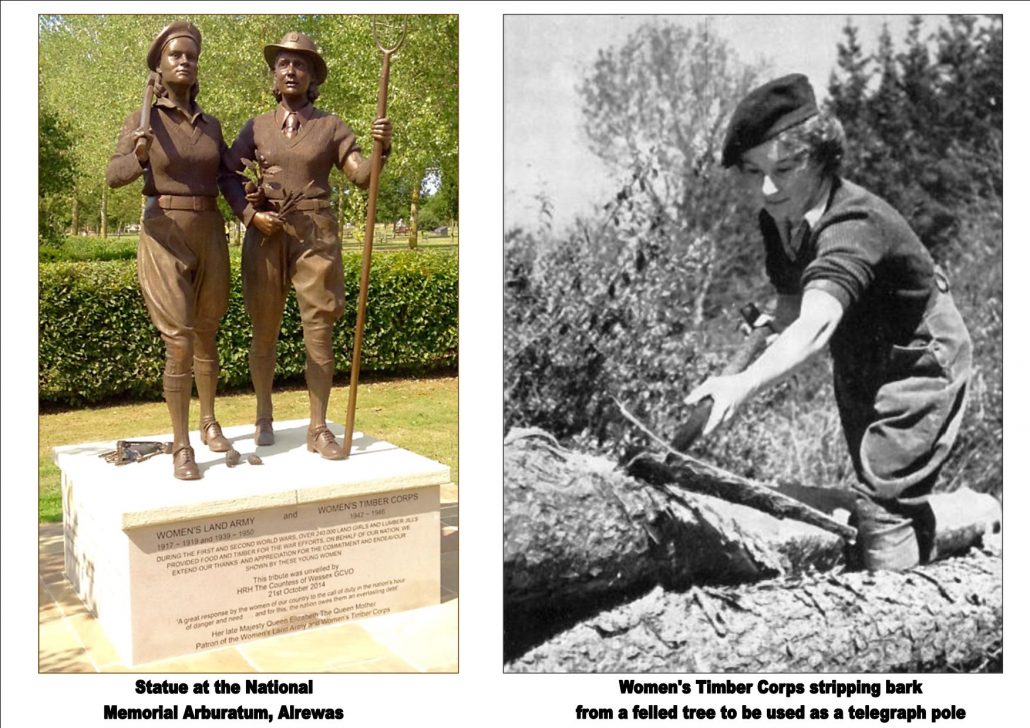
~ ~ ~
“My Life in the Land Army”
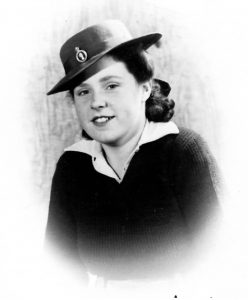
When war broke out I was a shop assistant in Phillips Bros in Neath. I had never done any heavy work except for a bit of housework. Just before my 18th birthday I was called up to work in a factory in Neath called the “Metal Clad”. This changed my whole existence. The first shock to the system was starting work at 6a.m. Then the noise of the factory machinery! I was put to work on carrying out inspections – we were making detonators for shells. The second shift was 2.00 to 10.00 p.m. and was long and monotonous. The work itself was quite soul destroying and I hated it.
So…I volunteered for the Land Army.
I was nearly 19 years of age when I started in the Forestry Commission. Our big chief was Lady Whitten Brown and her deputy was Mrs. Major Bevan, Glyn Clydach. I had my medical and passed fit. I was told to report to the forestry at Resolven catching the 7a.m. service bus from the station in Neath. On arriving at the station I met Rita, Hazel, Nita and Betty. We looked as if we were going on a safari to the Far East! We had taken all our clothes with us – overcoat, hat, stiff oilskins, boots, putties, breeches, skirt, pullover and dungarees. When we got out of the bus at Resolven we had to walk to the forestry house. I’m sure that Mr.Smith (the head forester) was dying to laugh. He took us up to the work centre – which was a large shed – and there we met the other girls. There were two from Cardiff and the rest from Swansea. There were also a few young boys (not old enough for the army), a ganger called Ted and another chap called Mr. Farily, who was a very tall Australian.
The next day we were put into gangs and were taken to a shed where all the tools were kept. I remember Mr Farily trying to teach me to cut hedges. Two of the Swansea girls lodged with Ted the ganger and the two girls from Cardiff lodged on the same estate. One thing I will always remember is that they would open their sandwiches and it was either Spam or cheese. We were all given an extra cheese ration!
During the first few weeks we spent our time near the huts weeding small trees. Then one day we were sent to different places. I was sent with Sheila, Olive and some young boys to Pentre Clwyda where we did more weeding using billhooks. Whilst there, I sliced off half my nail and we had a strike – but we soon settled down.
On running for the bus one night I stepped out of my wellingtons and got my feet soaking wet. Very often we had lifts home with Craven Llewellyn, Mr Parry Davies or Mr Danny Thomas.
One summer I did “whinberry patrol”. This meant watching out for people coming onto Forestry land to pick whinberries. They were supposed to have a pass which in those days cost l shilling. I did not sell my passes as the pickers were old stagers who knew how to dodge me. They had quite a little business going on. They would come early in the morning equipped with some big baskets and stay all day. They then sold the whinberries to stall holders in Neath market – rather them than me as whinberries are very difficult to pick.
Once I remember spending all day weeding which was quite back breaking. When it came time to finish I was tired and stiff. I happened to be first in line walking down the mountain path when I was suddenly yanked back and the chap behind me bent down and hit out with his stick. I yelled out “what’s the matter?” He replied “It’s OK; it’s only a snake and you were about to step on it”! You can imagine how I felt. Another day I had to walk up to the top of the mountain where there was a plateau where new trees had been planted which were about a foot high. Our job was to walk between the trees looking for a certain kind of beetle and the name of the project was “beetle drive”. In the middle of the day the forester, Mr. Smith, appeared. I didn’t hear him until he was right behind me and he got hold of my shirt collar and said he had put a beetle down my back. I went frantic trying to get it out until he burst out laughing and said it was a joke! The fact was that he was checking up on us as we all had jam pots to put the beetles in and he could then see how much work we had done.
There was a forester, Deputy Mr Lloyd, Foreman Mr Farily and Ted. One of these would appear out of the trees sometime during the day to check up on us.
I remember Mary Wheaton from Cardiff very well. She had a beautiful voice and would burst into song at various times during the day. One day we were singing a duet of the “Indian Love Call” while sawing branches off the trees on the Resolven side of the mountain and really enjoying ourselves. When we came to the end Mr Smith appeared from the trees and said “You come here to work not sing” and with him was the area forester who didn’t say a word.
You may wonder how we managed the toilet. It doesn’t take much imagination to know how to deal with passing water as many of you will have been caught short yourselves and gone behind a tree or bush. When it comes to a big job we had to dig a hole in the ground and then fill it in afterwards. There was no water to wash your hands so hygiene wasn’t the best.
There was a forestry hut where we kept our tools. It was a stone hut with big gaps between the stones where the wind whistled through. We complained about this and were left a bag of cement and sand and told to fill the gaps ourselves! We were only allowed to stay here if it was raining first thing in the morning and if it cleared up we were expected to go out to work. Sometimes we would be up to two miles up the mountain and it would come to rain. We carried a tarpaulin with us and if it rained we would tie each corner to a tree and shelter under it. If it was still raining at 3p.m. we were allowed to go home. Many a time we would be standing watching the rain come up the Neath valley, collect our tools ready to clear off when the rain would turn back on reaching Clyne and we had to carry on until 4.40p.m. ready to clear up and catch the 4.55 train to Neath.
I remember one morning we were told that some German prisoners had escaped from Stormy Down and had not been recaptured so we were quite scared. By this time we knew most of the men on the 6.30 bus and they would pull our legs about lots of little things especially when we used to fall asleep after the bus had left Neath and the conductor would wake us up when the bus got to Clyne. In winter it was dark so going up amongst the trees at half light with Germans about made it a bit scary. We worked very close together that morning and were very relieved when someone came to tell us that the Germans had been recaptured. Incidentally I was courting my husband Frank at this time and he was one of the soldiers who recaptured the Germans who were hiding in a railway truck in Llandow.
Whenever you travel near a forestry take a good look and you will see every so often a wide space between the trees which is called a “Ride”. It is put there in case of fire and it is to stop the fire spreading. Another thing you may notice is that the branches of the trees are cut off at a certain height from the ground. This is called “Brashing”. The funniest thing was when they brought us our axes to fell the trees it took a few days to master the technique of swinging the axe over the left shoulder as well as the right. The difficult part was getting the axe into the exact same spot on the base of the trunk so that the tree would fall the right way when it was felled through. When the tree fell we would shout “TIMBER” so that no one would be in the way. We then set to work sawing off all the branches with a girl on each side of a big cross cut saw to cut the branches into pit props. I should also mention that after taking the branches off we had to carry the trunk to the “level”. These trunks were very heavy and we either had to carry them on our shoulders or drag them with a rope down the mountain.
We had to take sandwiches and a thermos of drink with us every day. A thermos was a tricky thing to handle as we had to have a permit to buy one and they were not easy to come by. We were also given an extra cheese ration which was no good for me as I didn’t eat cheese but my father benefited from it.
At this time I was an opera fanatic and when the Carl Rosa opera company came to Swansea I used to try and get to see them during the week. So, my sister Lena and a few friends would go down to Swansea Empire after work and queue for tickets in the upper circle (the “Gods”). I would go to work in the morning in my best uniform and then wear a pair of dungarees on top to cover up. At the end of the day after a quick wash in the stream I would dash to Neath, change buses and get to Swansea at about 6p.m. to join the girls in the queue and eat whatever they had brought for me. It was then up to the front of the gods for the performance. It didn’t matter how hard the seats were as I was lost in the world of “Madame Butterfly” or “La Traviata” and kept singing all the way home. Another thing I recall was working on the Glynneath side of the mountain near Aberpergwm colliery. We used to sneak into their canteen and I used to buy the most delicious slice of bread pudding for a penny. On the other side of the mountain was Glyn Castle Colliery. The coal came from the top of the mountain and was sent down in drams. There was an overhead control cable for the drams and if you wanted to stop the drams you put the two cables together for them to stop. If we were working at the top of the mountain we used to stop the drams, jump in and have a ride to the top.
One day I was working on the Clyne side of the mountain, lashing around with the billhook when I hit a bee’s nest. You can imagine what happened. The bees came at me from all directions – they were down my wellingtons, up my jumper, in my hair and I was petrified. The girls rallied around to shoo them away and I was left there with stings all over. There was no first aid kit, so one of the girls went off to the nearest house and borrowed a blue bag. After plastering this all over myself I looked a bit peculiar but it did the trick.
In hindsight we were very lucky never to have had a fire in the forestry as the little stack of fire brushes at the entrance would not have been much good in dealing with a big fire. My experience in the Land Army was very eventful but I was still very glad when the war came to an end and I was “demobbed”.
Betty Charles
~ ~ ~
This article was published in “Hanes”, a quarterly magazine of the Skewen & District Historical Society
We are very grateful to Brian Charles for allowing us to reproduce the reminiscence by his mother Betty Charles and providing the accompanying photograph.
Also many thanks to Anne Morgan, Chair and the Committee of the Skewen & District Historical Society.
~ ~ ~
The present owners of the “forestry house” mentioned in the article, (still known locally in Resolven as ‘Mr Smith’s House’) are Carol Wilshire and her husband. Carol is a member of The Skewen & District Historical Society and we thank her for showing us this article.
In Betty Charles’s article she mentions “……..Another day I had to walk up to the top of the mountain where there was a plateau where new trees had been planted which were about a foot high.……. “
The following photographs are of recent tree harvesting by Natural Resources Wales and are probably some of the trees mentioned by Betty Charles.
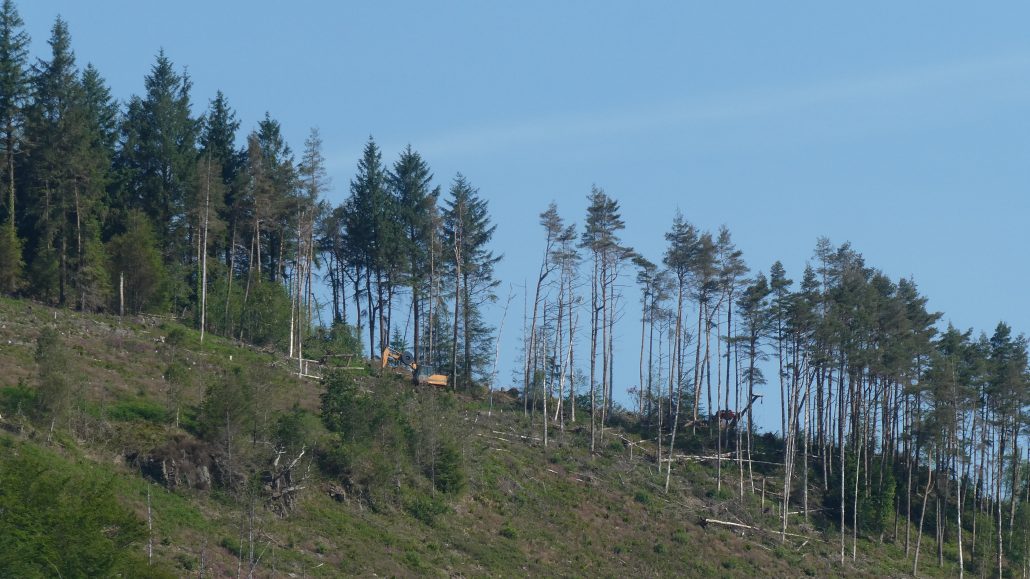
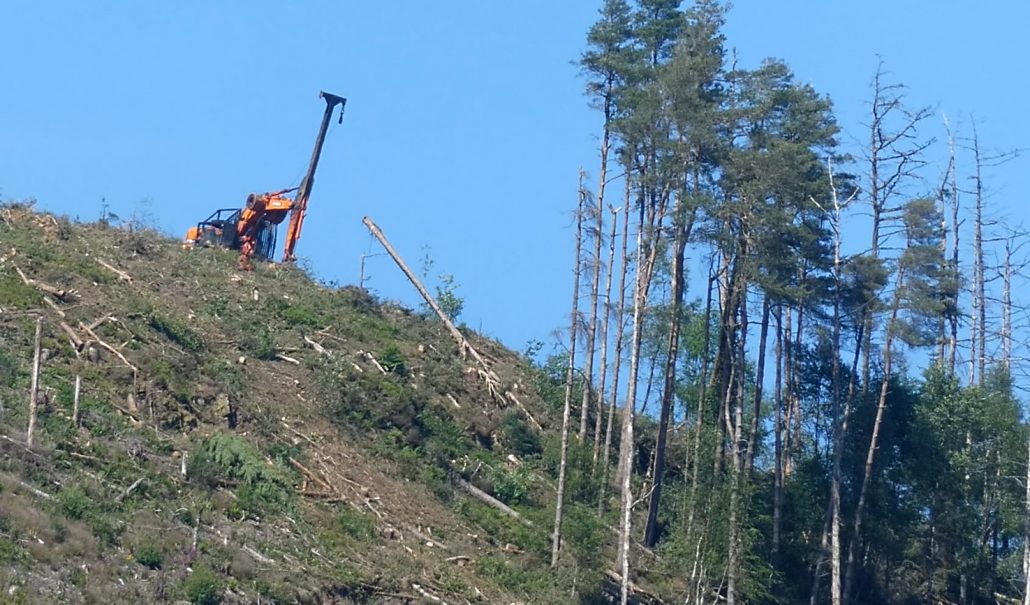
The same location as the previous photograph
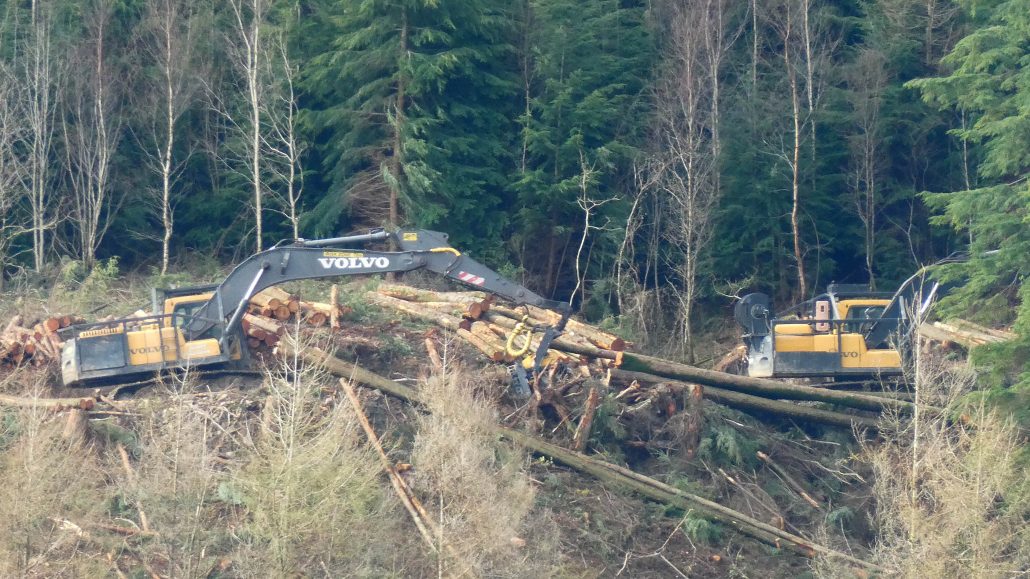
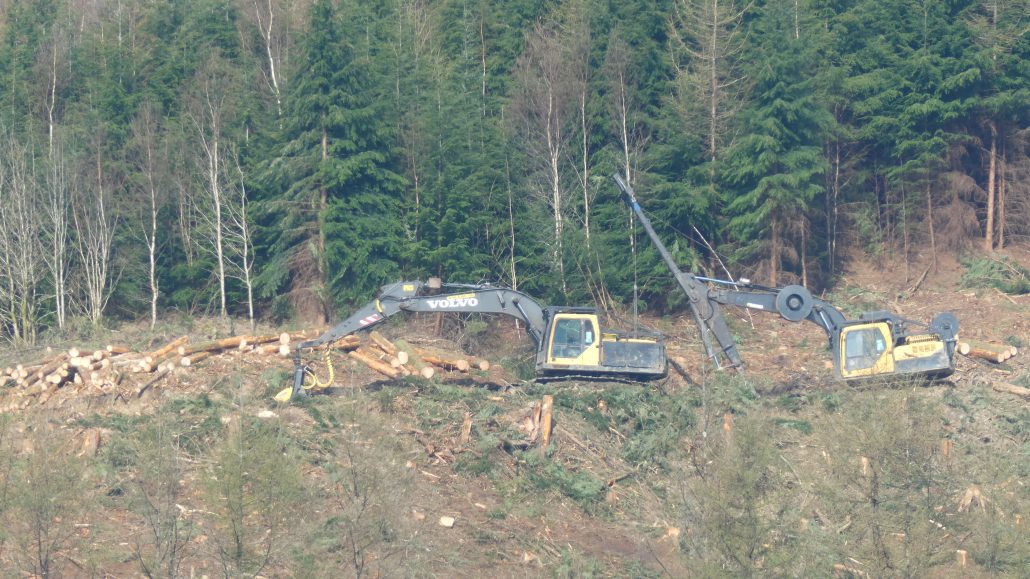
According to Natural Resources Wales ‘the Neath Valley forest amounts to 2,806 Hectares’ (1 Hectare = 2.47 Acres) and the ‘Rheola Forest section is located on the North West densely forested valley side which descends from Sarn Helen Roman Road to the old A465 in the valley bottom.’
Four Photographs by Hugh Lewis
~ ~ ~ ~
